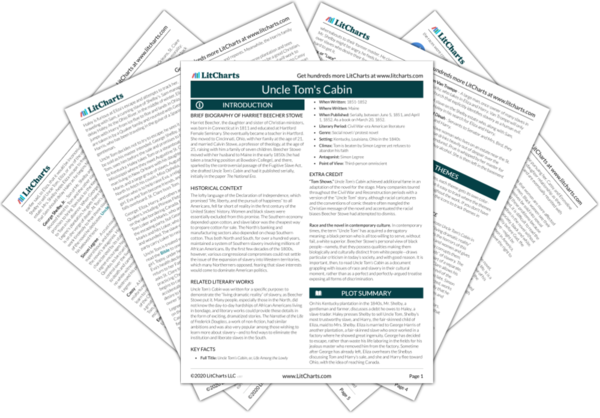Summary
Analysis
Uncle Tom takes over management of the St. Clare household’s finances. After St. Clare stays out late one night drinking, Uncle Tom chastises him for treating his body and soul poorly. St. Clare promises not to drink so much again. Miss Ophelia assumes management of the household and reorganizes the storage and arrangement of materials throughout the house, including in the kitchen, much to the annoyance of Old Dinah, the eccentric and disorganized head cook.
St. Clare is devoted to his daughter, but Tom questions his devotion to the health of his soul. Just as Miss Ophelia wishes to put the household’s affairs in order, Tom wishes to guide St. Clare in a “cleaning out” of his spiritual life, so that Christian faith might be allowed in.
Themes
Miss Ophelia reports to St. Clare on the state of chaos in his home. St. Clare replies that, because he does not wish to discipline his slaves, he must be content to live in a disorganized home. St. Clare appreciates Dinah as a cook, has no desire to see what goes on in the kitchen, and figures that an efficient household system would only give him more time in which to be lazy.
This is an example of St. Clare’s “shiftlessness,” which is appalling to Miss Ophelia but which also enables the slaves to achieve a kind of “freedom” in the St. Clare household. Though St. Clare still owns them, they are treated with respect.
Themes
Ophelia believes that some of the slaves might be tricking St. Clare, stealing from him, or dishonestly reporting their work. St. Clare answers that the “dependent, semi-childish state” of slavery is to blame for this “shiftlessness,” and white people, after all, maintain this state.
St. Clare repeats a sentiment from earlier in the novel: that slaves cannot be expected to behave as free men and women, because they are not afforded the education and opportunity for self-fulfillment that free people are.
Themes
A drunk slave named Prue, who belongs to another master, enters the St. Clare kitchen sometime later. Prue is a slave who takes money behind her master’s back and uses it to buy alcohol, maintaining a state of perpetual drunkenness to hide her sadness. When Prue enters, Tom offers to carry her basket, and Prue tells him her life-story: she gave birth to many children who were sold to other owners, and though she was allowed to keep her last child, she became sick and couldn’t nurse her child, who died. Prue says that she has no need for going to heaven, since white people go there. She would rather go to Hell to escape them.
Prue’s story foreshadows Cassy’s on the Legree plantation. Prue is an example of a women so broken by the cruelties of slavery that she cannot recover. Although Miss Opehlia finds her drunkenness offensive, St. Clare has an easier time understanding her melancholy and total dejection. Prue's desire to go to Hell if it means avoiding white people is another point about the incompatibility of slavery and Christianity.
Themes
Get the entire Uncle Tom's Cabin LitChart as a printable PDF.













